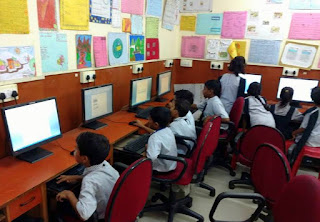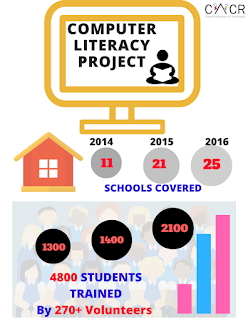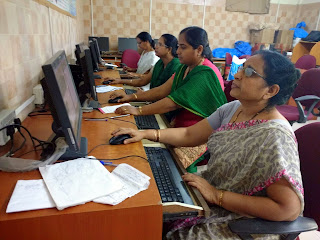Computers are part of global business and education. So
digital literacy has a direct effect on the country’s economy. India as a country is facing several
challenges in the implementation of initiatives like Digital India. Moreover, digitally literate teachers
appreciate the creative potential of technology rather than accepting it
unwillingly as another training exercise mandated by the government. Digital
literacy ensures that teachers use the digital tools that can unlock their
deeper teaching potential and make learning exciting.
Many Municipal Schools in Mumbai have computer labs with
working computers, but unfortunately, they do not have teachers who can impart
necessary IT skills. Students and educators from the vernacular mediums also
find it difficult to grasp the content as computers are programmed in English. To
help the students and teachers of MCGM schools, 'The Computer Literacy Program'
(CLP) was initiated by Citizens Association for Child Rights CACR in June 2013
with content partners IITB -The Indian Institute of Technology Bombay.
 |
| Our young minds engrossed in their Computers! |
But in 2015 the teaching methodology of IIT Spoken tutorials
underwent a change and required the computers in MCGM schools to be upgraded to
a better Operating system (OS) and Antivirus. Since such major hardware changes
were not possible to be implemented by the government's education department in
a short period, the collaboration with IITB had to be called off until the
hardware upgrade. Given the training momentum that was built in the last 2.5
years, CACR decided not to abandon the project but continued training students.
Zinal Shah stepped in and continued the project for a year, teaching students
basic IT skills using Microsoft Office.
The present project head Ar. Deyasini Choudhary
tells me that volunteers provide one-on-one attention to each school student. A
PowerPoint Presentation takes volunteers through each session so that they come
prepared with the topic they will cover and with a proper understanding of how
they should teach that subject. About 1250 children in 18 municipal schools
have benefitted from CACR’s Computer Literacy Program. Team CACR is hoping
numbers pick up substantially in the coming months.
 |
| The incredible progress CACR has made with the Computer Literacy Project. |
 |
| Teachers engaged in the program. |
CACR has successfully lobbied with the MCGM departments to
ensure each of the 200 School buildings get its very own full-time computer
teacher. This will be a first major development in the history of computer
education in MCGM education department. CACR
has been fostering Digital Literacy at the school level via these two programs
that aid India's National Digital
Literacy Mission, which is working towards a bridging our country’s digital
divide.
We are on a mission to bridge the digital divide. We Hope You Join Us!
-By Noella Pereira a volunteer with CACR an NGO working in
MCGM schools to improve health and education.
Edited by +Richa Singh ichaSingh Projects Director CACR

